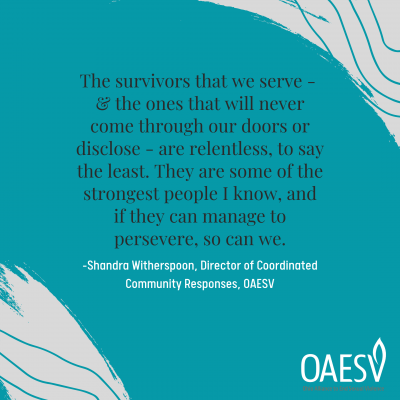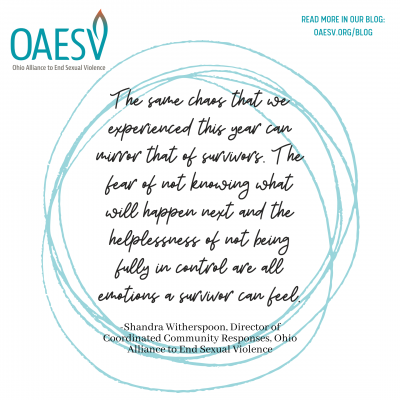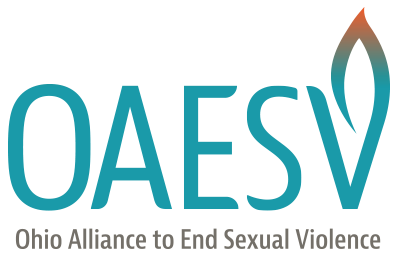The Fear of Not Knowing & The Resilience of Survivors and Communities
This entire year has hands down been one for the history books. From battling dueling pandemics to watching unprecedented political events, I can truly say 2020 has brought challenges I never thought I would face. Never have I experienced nightly curfews that spread across the world, stores void of basic necessitates such as meat and cheese, or news channels broadcasting daily numbers of those who have either fallen ill or passed away from COVID-19. Authors could publish an entire history book using events that happened this one year alone. However, as I reminisce about all the negative aspects of 2020, I am keenly reminded about all of the good that has blossomed from this year as well.
 We have all seen heart-wrenching stories of neighbors stepping up and helping one another get through this difficult time. Parents taking turns hosting homeschooling sessions, families throwing drive through graduations, and kids helping their parents and grandparents log in to family Zoom calls. But I am particularly reminded of the relentless work of our first responders, specifically those who comprise Ohio’s Sexual Assault Response Teams (SARTs). When our state began shutting down, I watched and heard advocates weep after receiving the news that for the time being, they could not physically escort survivors to court, accompany them at hospitals for forensic exams, or, depending on the program’s budget, provide them with tele-advocacy services. You see, being an advocate is not simply a 9am-5pm job, it is who someone is at their core. Nevertheless, advocates from around the state rose to the occasion and did what they do best, adapt to the new normal. They called survivors to update them on the status of their court cases; they either phoned in or made a way to video conference survivors who were at local hospitals seeking services; and they worked diligently to remind the public that although their doors may be physically shut, they were indeed open for business and stood ready to support their communities.
We have all seen heart-wrenching stories of neighbors stepping up and helping one another get through this difficult time. Parents taking turns hosting homeschooling sessions, families throwing drive through graduations, and kids helping their parents and grandparents log in to family Zoom calls. But I am particularly reminded of the relentless work of our first responders, specifically those who comprise Ohio’s Sexual Assault Response Teams (SARTs). When our state began shutting down, I watched and heard advocates weep after receiving the news that for the time being, they could not physically escort survivors to court, accompany them at hospitals for forensic exams, or, depending on the program’s budget, provide them with tele-advocacy services. You see, being an advocate is not simply a 9am-5pm job, it is who someone is at their core. Nevertheless, advocates from around the state rose to the occasion and did what they do best, adapt to the new normal. They called survivors to update them on the status of their court cases; they either phoned in or made a way to video conference survivors who were at local hospitals seeking services; and they worked diligently to remind the public that although their doors may be physically shut, they were indeed open for business and stood ready to support their communities.
Simultaneously, I heard the despair in nurses’ voices when they shared with me the fear of being pulled back to the respective floors to assist with the influx of patients, knowing that this would mean survivors would possibly have an extended wait time in their absence. I saw the look of tiredness in their eyes as they were working day in and day out, putting their lives in danger to not only serve survivors of violence but those suffering from COVID as well. Nevertheless, all of the SANEs (sexual assault nurse examiners) I heard from around the state echoed the same sentiments: they would ensure survivors had access to the care they needed and deserved, even if it looked a little different as hospital policies continued to change rapidly. They embraced tele-advocacy services and made sure that survivors had access to advocacy, whether by phone, video call, or fax machine. This was an added step they did not have to take on, but did so with pride, ensuring survivors received not only the medical services but advocacy services they are all entitled to.
Likewise, over the past year, I have spoken with several law enforcement officers who have struggled to adequately support survivors amid these pandemics. However, they were all determined to ensure they adopted protocols to accommodate survivors, while still maintaining the integrity of the law. I assisted some law enforcement agencies in altering how they responded to hospitals to collect evidence. I watched them work collaboratively with nurses to find alternative pick up spots in hospitals, possibly meeting one another on the labor and delivery floor instead of the ER to ensure both parties were safe. I’ve spoken with several officers who have been interviewing survivors via tele-conferencing so that their investigations did not get stalled.
 While our Stay-at-Home Orders forced courts to close for the safety of those who work in our legal system, I spoke with a few prosecutors who were worried about how they were going to support survivors whose cases were nearing trial. They were agonizing over the inevitable delays this would bring about. More specifically, they spoke about the strength it had taken survivors to finally get prepped and ready to read their Victim Impact Statements in court, an act that would mean facing their offender. They feared the closings could force them to change their minds, as navigating any court’s legal systems can be overwhelming and draining; then add in a national pandemic, and that makes the feat so much more exhausting and debilitating. And because of this, the prosecutors I worked with found innovative ways to stay in communication with their clients, informing them of court policy changes.
While our Stay-at-Home Orders forced courts to close for the safety of those who work in our legal system, I spoke with a few prosecutors who were worried about how they were going to support survivors whose cases were nearing trial. They were agonizing over the inevitable delays this would bring about. More specifically, they spoke about the strength it had taken survivors to finally get prepped and ready to read their Victim Impact Statements in court, an act that would mean facing their offender. They feared the closings could force them to change their minds, as navigating any court’s legal systems can be overwhelming and draining; then add in a national pandemic, and that makes the feat so much more exhausting and debilitating. And because of this, the prosecutors I worked with found innovative ways to stay in communication with their clients, informing them of court policy changes.
It’s true, 2020 has been a long, difficult year for some, but I am glad that I have had time this month to reflect on the amazing examples of first responders coordinating comprehensive response protocols to ensure survivors were still supported throughout this year. And more importantly, I am reminded that the same chaos that I experienced this year can mirror that of survivors. The fear of not knowing what will happen next and the helplessness of not being fully in control are all emotions a survivor can feel. You see, there are many of us in this world who feel like 2020 is no different than any other year, especially since every 73 seconds, an American is sexually assaulted[1]. Yet, the survivors that we serve, and the ones that will never come through our doors or disclose, are relentless, to say the least. They are some of the strongest people I know, and if they can manage to persevere, so can we.
- [1] Department of Justice, Office of Justice Programs, Bureau of Justice Statistics, National Crime Victimization Survey, 2018 (2019). Note: RAINN applies a 5-year rolling average to adjust for changes in the year-to-year NCVS survey data.
